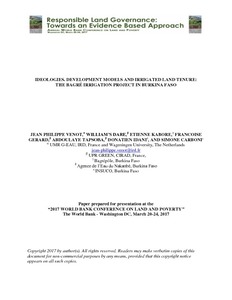Resource information
This paper discusses the history of irrigation development and related land allocation in the Bagré area in the South of Burkina Faso. It specifically analyses current processes at play as part of the recent Bagré Growth Pole Project implemented by the government of Burkina Faso with support of the World Bank. The paper stresses the efforts made to put in place a fair and equitable compensation mechanism for the people being affected by the extension of the irrigated area downstream of the Bagré dam. The practicalities and thresholds considered in the compensation scheme are partly driven by the need to free some rainfed land to allow agro-entrepreneurs to settle in the area, financially contribute to the infrastructural costs of developing irrigation, and develop intensive and profitable irrigated production systems. This leads to socially constructing land scarcity, and threatens the future viability of smallholder farming. This happens even though the expressions of interests received to date by Bagrepole from agro-entrepreneurs appear little likely to trigger the virtuous development circle hoped for.



